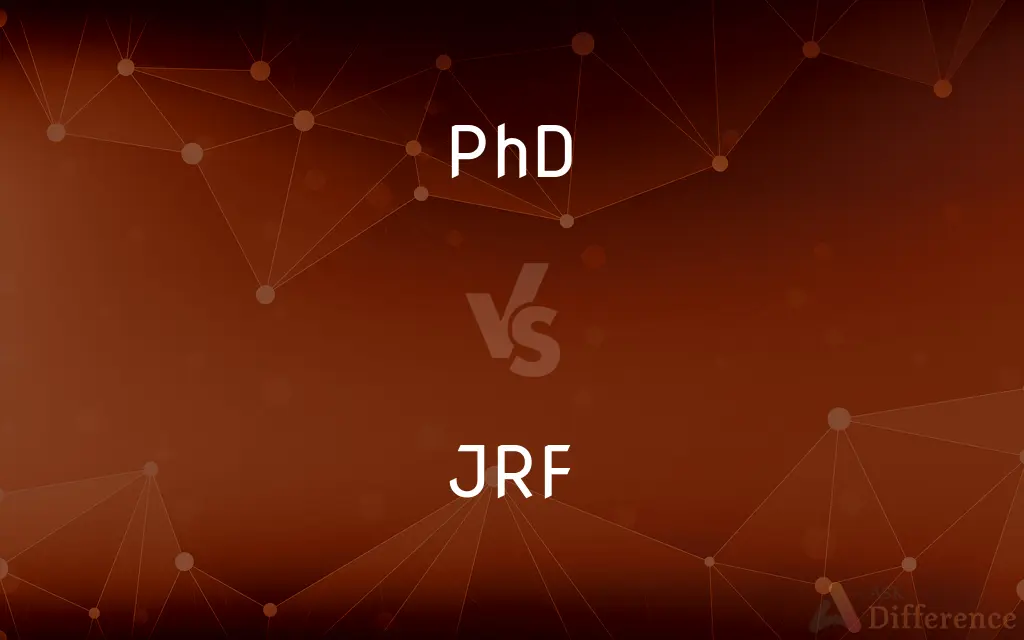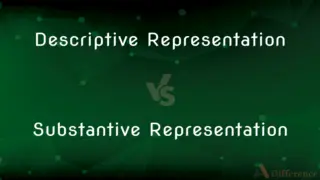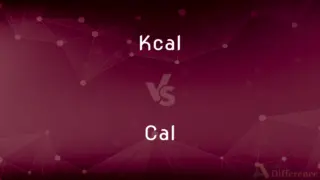PhD vs. JRF — What's the Difference?
Edited by Tayyaba Rehman — By Fiza Rafique — Published on December 27, 2023
PhD (Doctor of Philosophy) is an advanced academic degree representing mastery in a field, while JRF (Junior Research Fellowship) is a research grant for early-career researchers.

Difference Between PhD and JRF
Table of Contents
ADVERTISEMENT
Key Differences
PhD and JRF are two terms often used in the academic and research domain. A PhD, which stands for Doctor of Philosophy, is an advanced academic degree that individuals pursue after completing their master's. Upon enrolling in a PhD program, candidates embark on extensive research, often culminating in a dissertation, which is a detailed document presenting their findings. A PhD showcases the candidate's mastery in their chosen field, and once they complete the program, they can be regarded as experts.
On the other hand, JRF, standing for Junior Research Fellowship, is not a degree but a research grant. JRF is typically awarded to individuals at the early stages of their research career. This fellowship provides financial support, enabling recipients to focus on their research. Many academic institutions or government bodies offer JRFs as a means to promote and foster research in various disciplines.
While a PhD often requires several years of rigorous research and study, JRF is a fixed-term fellowship, generally spanning a few years. The primary goal of a JRF is to provide budding researchers the resources they need to conduct their research, which might sometimes be a part of their PhD studies.
In essence, while a PhD is a mark of expertise and deep knowledge in a subject, the JRF is a financial grant meant to aid in the research process. It's worth noting that an individual can be a JRF recipient while simultaneously pursuing a PhD, using the fellowship to fund their doctoral research.
Comparison Chart
Definition
Advanced academic degree
Research grant
ADVERTISEMENT
Nature
Degree
Fellowship/Grant
Duration
Several years (varies by field & region)
Fixed-term (often a few years)
Objective
Mastery in a field, original research contribution
Financial support for early-stage research
Result
Awarded a doctoral degree
No degree, but research support and possible recognition
Compare with Definitions
PhD
An advanced academic degree pursued after a master's.
She earned her PhD in marine biology after seven years of intensive research.
JRF
A research grant for budding researchers.
She received a JRF, allowing her to focus on her studies without financial stress.
PhD
A mark of expertise and deep knowledge in a specific field.
After completing his PhD, he was considered an expert in ancient civilizations.
JRF
Awarded by academic institutions or government bodies.
The government's JRF initiative supports hundreds of young researchers annually.
PhD
A journey of scholarly exploration, producing original research.
Through his PhD, he introduced novel techniques in software engineering.
JRF
Provides resources and sometimes recognition in the research community.
With the help of JRF, she presented her findings at international conferences.
PhD
Represents rigorous research culminating in a dissertation.
Her groundbreaking dissertation earned her the PhD with distinction.
JRF
Often used to support PhD research.
While pursuing his PhD, the JRF grant covered his research expenses.
PhD
Highest academic degree awarded by universities.
Achieving a PhD is the pinnacle of academic success for many.
JRF
Financial support for early-stage academic research.
His innovative proposal earned him a JRF from a prestigious institution.
PhD
An American doctorate usually based on at least 3 years graduate study and a dissertation; the highest degree awarded by a graduate school
Common Curiosities
Can someone get a JRF while pursuing a PhD?
Yes, many researchers receive a JRF to support their PhD research.
What does PhD stand for?
PhD stands for Doctor of Philosophy.
What is JRF in the context of research?
JRF stands for Junior Research Fellowship, a grant for early-career researchers.
How long does it typically take to earn a PhD?
The duration varies, but a PhD often takes several years of study and research.
Is JRF a degree like a PhD?
No, JRF is a research grant, not an academic degree.
Do all PhD candidates receive a JRF?
No, JRFs are awarded based on various criteria, and not all PhD candidates receive one.
Can one get multiple JRFs during their research career?
It depends on the stipulations of the granting body, but researchers can potentially secure multiple fellowships.
Can someone with a JRF but without a PhD be regarded as an expert?
While a JRF indicates research potential, a PhD is generally recognized as a mark of expertise.
Does every field of study offer a PhD?
While many fields offer PhD programs, it varies based on the discipline and academic institution.
What is the purpose of a JRF?
The primary purpose of a JRF is to provide financial support for early-stage research.
What's the main outcome of a PhD?
Completion of a PhD typically results in a doctoral degree and recognition as an expert in the field.
Do all universities offer PhD programs?
Not all, but many universities around the world offer PhD programs in various disciplines.
How is the JRF amount determined?
The JRF amount is often determined by the granting body based on the project's needs and the researcher's qualifications.
Can someone directly pursue a PhD after a bachelor's degree?
In some fields and regions, yes. However, many programs require a master's degree or equivalent before pursuing a PhD.
Are JRFs only available in academia?
While common in academia, some governmental or independent research bodies also offer JRFs.
Share Your Discovery

Previous Comparison
Descriptive Representation vs. Substantive Representation
Next Comparison
Kcal vs. CalAuthor Spotlight
Written by
Fiza RafiqueFiza Rafique is a skilled content writer at AskDifference.com, where she meticulously refines and enhances written pieces. Drawing from her vast editorial expertise, Fiza ensures clarity, accuracy, and precision in every article. Passionate about language, she continually seeks to elevate the quality of content for readers worldwide.
Edited by
Tayyaba RehmanTayyaba Rehman is a distinguished writer, currently serving as a primary contributor to askdifference.com. As a researcher in semantics and etymology, Tayyaba's passion for the complexity of languages and their distinctions has found a perfect home on the platform. Tayyaba delves into the intricacies of language, distinguishing between commonly confused words and phrases, thereby providing clarity for readers worldwide.














































